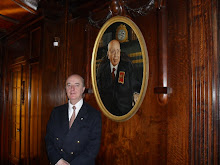7 de noviembre de 2018
Why Israelis are So Concerned With Their Next Chief-of-Staff
Wednesday, November 07, 2018 | Tsvi Sadan
Israel Defense Minister Avigdor Liberman recently announced that Maj.-Gen. Aviv Kochavi will be the IDF's next Chief-of-Staff. I doubt whether most Germans, Americans, Italians or any other nationality know the name of their respective military commander, let alone his views on morality, ethics or political issues.
Though in Israel everybody knows the name of the current Chief-of-Staff, until recently few would even care to know what he thinks about non-military issues. This time, however, it was obvious that many Israelis were deeply interested in, even concerned by, the next Chief-of-Staff's positions.
Of the three candidates–Yair Golan, Nitzan Alon and Aviv Kochavi–the first two had previously spoken their minds on issues that positioned them clearly on the political left. In a 2011 interview with The New York Times, Nitzan Alon labeled the Jewish extremists in the "Price Tag" movement as terrorists. In 2011, Price Tag was blamed for the fire that destroyed a mosque in the Bedouin village of Tuba Zangaria, as well as for the desecration of Christian and Muslim graves in Jaffa. But the presiding judge in the arson case couldn't find enough evidence to convict Price Tag thugs. The then-chief of police similarly had to blame the desecration of minority graves vaguely on "hooligans." Nitzan Alon's haste to accuse Price Tag and to even call it a terror group led Jewish settler leader Benny Katzover to demand that the defense ministry prevent him from climbing any higher up the ranks.
Maj.-Gen. Yair Golan similarly caused an uproar with his 2016 Holocaust Remembrance Day speech, in which he drew a parallel between the final days of the Weimar Republic in 1933 and the present right-wing political atmosphere in Israel. "It's scary to see horrifying developments that took place in Europe begin to unfold here," he said back then.
Both Alon and Golan broke the unwritten code of army personnel not expressing their opinions on political issues.
To put things in perspective, in 2010, then-US President Barack Obama effectively fired the outstanding Gen. Stanley McChrystal following a Rolling Stones interview in which the decorated officer and his staff criticized top White House officials regarding their policies and grasp of the situation in Afghanistan. Wired magazine rightly observed that "keeping General Stanley McChrystal in place would have shattered the chain of command, obliterated the authority Obama had with the military, and undermined any hope of waging a successful counterinsurgency in Afghanistan."
But, in Israel, things are not so clear-cut. Controversial ideologies creeping into the army have become a major issue ever since current Chief-of-Staff Lieut.-Gen. Gadi Eizenkot openly condemned Sgt. Elor Azaria for killing a wounded terrorist in March 2016. The rush to condemn a soldier even before an investigation into his actions had begun was interpreted by many as an abandonment of an irreplaceable camaraderie in exchange for "values" resembling those of a human rights organizations.
Nor was Eizenkot's behavior during the Azaria affair a fluke. Last February, a leaked Cabinet discussion revealed that our current chief-of-staff's sense of morality is controversial, to say the least. Asked why he hadn't done more against those sending flaming kites and balloons across the Gaza border, Eizenkot responded that it was "against my operative and moral position" to do so. The recent IDF response to dozens of terrorist rocket fired at the town of Sderot again demonstrated this odd "moral position." Though 90 targets were struck throughout Gaza, not a single Hamas or Islamic Jihad terrorist was harmed. In today's IDF, killing terrorists is apparently a morally questionable endeavor.
In this light, Liberman's choice of Aviv Kochavi seems to be wise, given that he is the only candidate not tainted by ideological bias. By so doing, Liberman has averted, at least for now, a tidal wave that could have wholly swept the army into the bitter political fray.
PHOTO: Maj.-Gen. Aviv Kochavi during a ceremony at IDF headquarters in Tel Aviv. (Flash90)
Suscribirse a:
Enviar comentarios (Atom)





No hay comentarios:
Publicar un comentario